Seagate Enterprise v4 – 6TB
Product page here. Here is KitGuru's take on the launch.
Nearline storage refers to archiving technology that has previously used tape for its massive capacity but is now shifting over to hard drive for increased speed. This is only possible with the increasing capacity of hard drives to avoid having an array with an enormous number of drives.
The 6TB Seagate is a beefy drive that is built around six 1TB platters. You get an indication of the technology that lies inside when you look at the bottom of the drive. You get the four mounting screw holes that you would expect however the positions have been moved from the central area of the drive. On the sides of the drive there are only two screws holes on either side as the central thread has been removed. If you are mounting your drives using screws in slotted caddies you should have no problem, but it would be worth checking that any tool-free caddies you may be using are compatible with this unusual layout.
The interface on this model is SATA 6GB/sec however Seagate also has a range of Enterprise drives with SAS 12GB/sec interface.
Inside the Enterprise v4 those platters spin at 7,200rpm and are allied with 128MB of cache and dual processors as well as features such as error correction and vibration tolerance. The claimed sustained data transfer rate of 216MB/sec is high by any standards and impressive for a drive that comes with a five year warranty.
One intriguing feature that appears to be unique to Seagate is Instant Secure Erase technology. In essence the Enterprise v4 has full drive encryption so when the time comes to retire the drive or pass it to a new owner you can use a Seagate utility to perform a Seagate Instant Secure Erase which destroys the previous encryption key and generates a new key. This simple act makes it impossible to read any of the existing data on the drive.
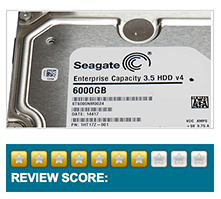 Testing the Seagate Enterprise v4 6TB as a regular SATA drive was an eye opening experience. As you can see from HD Tach and CrystalDiskMark this is a fast drive, and more to the point it is consistently fast. HD Tach agrees with Seagate's claimed speed and delivers a figure of 219.6MB/sec and CrystalDiskMark is slightly faster.
Testing the Seagate Enterprise v4 6TB as a regular SATA drive was an eye opening experience. As you can see from HD Tach and CrystalDiskMark this is a fast drive, and more to the point it is consistently fast. HD Tach agrees with Seagate's claimed speed and delivers a figure of 219.6MB/sec and CrystalDiskMark is slightly faster.
In IOMETER the Seagate storms along with a maximum Read of 184.6 IOPS and Maximum Write of 121.3 IOPS. Those figures aren't hot compared to a Solid State Drive but they are impressive for a hard drive.
The only weakness of this drive is that it is rather juicy, drawing 10.0W at idle and 12.3W under load. Having said that the Seagate didn't get noticeably hot and was impressively quiet.
When the Enterprise v4 was installed in a Synology DS414J NAS the performance leveled off to within an ace of the Toshiba and WD. Clearly this NAS hardware acts as a bottleneck to performance so if this is your intended application then the Seagate is probably more hard drive than you need.
Discuss on our Facebook page, over HERE.
Pros:
- Epic Enterprise performance.
- Hefty 6TB capacity.
- Secure Erase facility.
- Five year warranty.
Cons:
- The price is horribly high.
- In a NAS the extra performance doesn't shine through.
- Power draw is a touch too high.
KitGuru says: The 6TB Seagate Enterprise v4 is a sophisticated Enterprise drive that costs a small fortune and is overkill for a home or SOHO NAS.
 KitGuru KitGuru.net – Tech News | Hardware News | Hardware Reviews | IOS | Mobile | Gaming | Graphics Cards
KitGuru KitGuru.net – Tech News | Hardware News | Hardware Reviews | IOS | Mobile | Gaming | Graphics Cards


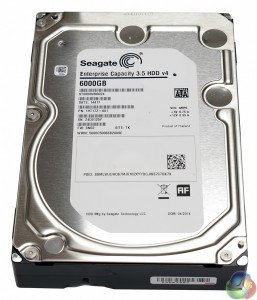
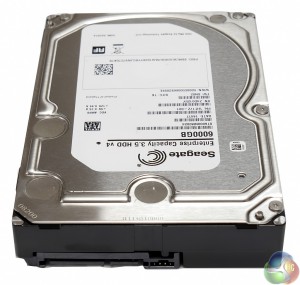
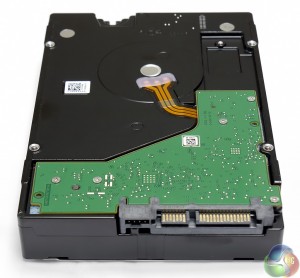
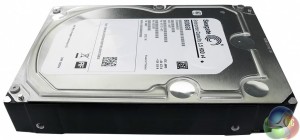
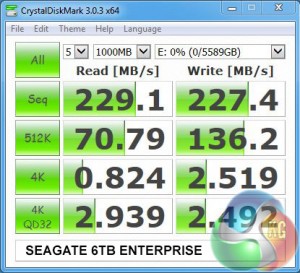
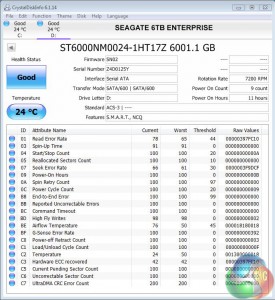
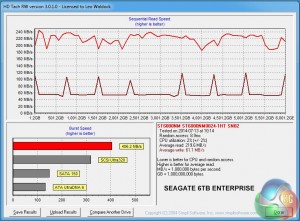
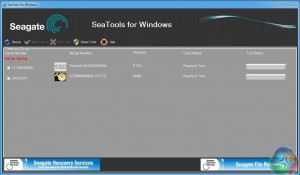


i have 3 tbs if i need more i shall get an hdd barracuda i would not buy anyother harddrive if i can help it
I have a chepo 1TB samsung that came with my pre.built PC, and later got a 1TB WD blue. So far I dont need more, but if I do, I might as well buy a new PC (current I3 3220 NVidia GT 240, 4gb RAM) get an SSD, and free that ~300MB space from windows.
Cloud storage isn’t as expensive as you make it out to be.
$119.88 (~£72) will get you 1TB on Google Drive. That’s £327 less than Dropbox per year for double the space!!!
There’s also Google Drive for Work which gives you an *unlimited* amount of space for $10/user/month (so roughly £361.80 per year because there is a minimum of five users to get unlimited space). That’s still cheaper than Dropbox and you could store all of your Blu-rays in the cloud. 🙂
That said, a 6TB HDD (or two) would still be cheaper when the cost is spread over 3-5 years.